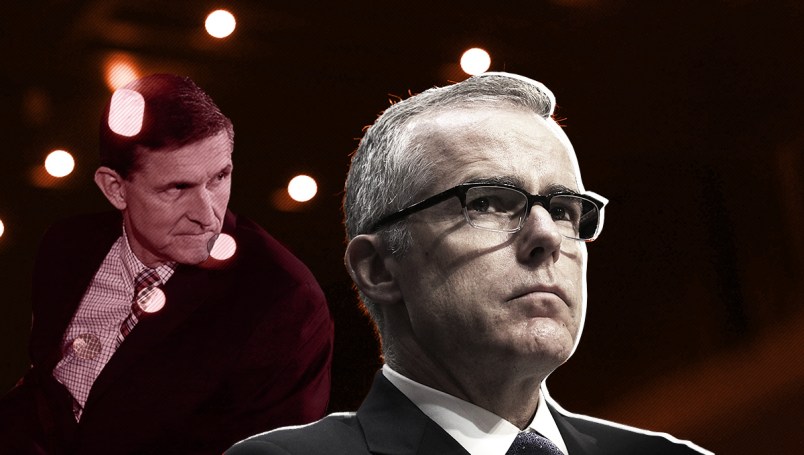Thanks to a new book by Andrew McCabe — the former deputy director of the FBI who was fired last year — we now know why information about Michael Flynn’s infamous conversations with Sergey Kislyak was passed on from the intelligence community to the FBI during the Trump transition. McCabe also described in detail Vice President Mike Pence’s own reaction when he saw the underlying intelligence confirming Flynn had discussed sanctions with Kislyak — contradicting what Flynn had told Pence about the conversations.
The episode is one of several recounted by McCabe from the period between late 2016 and early 2017 that would go on to define Trump’s presidency. His book, “The Threat,” released Tuesday, paints a fuller picture of the earthquake within the U.S. government as it wrestled with the discovery that Flynn had the conversations the Russian ambassador and then had lied about them, including in a pivotal Jan. 24 FBI interview.
About three weeks later, Flynn was ousted over the episode, and not long after that, Trump asked then-FBI Director James Comey to lay off of Flynn. By pressuring Comey, and by later firing Comey himself, Trump set the stage for the appointment of special counsel Robert Mueller in May 2017.
But back in late 2016, according to McCabe’s book, the FBI staff in charge of putting together the President’s Daily Briefing wanted to understand why Russian President Vladimir Putin had reacted the way he did to sanctions imposed on Russia by the Obama administration.
The FBI invited the intelligence community to offer any information that should be considered as it put together an assessment, per McCabe, of Putin’s “unusual and uncharacteristic” Dec. 30 response that there’d be no retaliation for the sanctions.
“We came across information,” McCabe wrote, referring to the intelligence that Flynn had discussed the sanctions with Kislyak on Dec. 29, the day the sanctions were announced.
“This information was something we had from December 29,” McCabe wrote. “I had not been aware of it. My impression was that higher-level officials with in the FB’s counterintelligence division had not been aware of it. The [President’s Daily Briefing] request brought it to our attention.”
The information went from an analyst to McCabe to Comey to then-Director of National Intelligence James Clapper, who briefed President Obama on it verbally. There were then “high-level discussions,” according to McCabe, about whether the conversations were a violation of the Logan Act — which bars unauthorized people from negotiating disputes between foreign countries and the U.S. — and whether Trump’s transition team should be briefed on Flynn.
The FBI’s preference was that it continue investigating the matter. It believed briefing Trump’s team would compromise the ability to conduct such a probe, as “we were concerned that this might make it back to Flynn,” McCabe wrote.
“I also had some concern about how open the president-elect would be to hearing what we learned,” McCabe added.
McCabe’s account of how Flynn’s interview with the FBI later came about aligns mostly with his and the FBI’s contemporaneous notes on the affair, which became public in December 2018.
“One thing he said stands out in my memory,” McCabe wrote, of his phone call with Flynn setting up the interview. “When I told him that people were curious about his conversations with Kislyak, Flynn replied, You know what I said, because you guys were probably listening.”
“To Flynn’s specific point, I had and have no comment,” McCabe wrote, “But I wonder as events played out: If you thought we were listening, why could lie?”
Flynn admitted to to lying in the January 2017 FBI interview in a Dec. 2017 guilty plea in Mueller’s probe, with which he is now cooperating.
What happened after the interview — and specifically the efforts by then deputy attorney general Sally Yates’ to inform the White House of Flynn’s false account of the conversations — has been thoroughly recounted in congressional testimony and independent reporting.
However, McCabe’s book provides more detail about how Pence, then-White House chief of staff Reince Priebus and then-White House Counsel Don McGahn came to view the underlying intelligence showing Flynn had discussed sanctions with Kislyak.
Priebus, who was with Pence and McGahn, asked McCabe for the information on Feb. 10, 2017, after McCabe had given Pence’s staff a defensive briefing.
Asked how soon they could see the information, McCabe told Priebus as soon he could get the information from his office.
“Priebus said, Where’s you office? I said, the Hoover Building. He said, Where’s that?” McCabe wrote.
A McCabe colleague brought the information to the White House and McCabe presented it to Pence, who had, at this point, publicly recounted assurances he received from Flynn that sanctions weren’t discussed.
“[Pence] reached the part that we had been focused on, and immediately his face changed,” McCabe wrote. “His expression turned very cold. It hardened. His reading became very focused. His head showed but barely — tiny shakes of no. He said a few things along the lines of I can’t believe this, and This is totally opposite, and It’s not what he said to me.”
Later that day, White House officials reportedly questioned Flynn about the conversation, and then advised Trump to fire him. The President, for reasons still not totally understood, stalled for three more days. He didn’t act until word leaked about the concerns raised by the Justice Department that Flynn’s false statements about the conversations made him vulnerable to Russian blackmail.






